

Candy Japan 2017 Year in Review
Hello internets, Bemmu here.
I run a site called Candy Japan, which ships boxes of Japanese surprise candies to subscribers around the world, twice a month.
Five years ago I started writing these annual review posts after being inspired by patio11's year in review posts. They are a great way to reflect on each year, and inspire me to improve. In this one I'll start off with some background for those who haven't been following the previous ones and then proceed to the numbers for this year.
My background
As a computer science student in Finland I had a lot of side projects, with some of them generating some income as well. Learning Japanese has always been a major life goal for me. My minor subject was Japanese, and as part of my studies I spent 2 years as an exchange student in Tokyo. I was still eager to continue to improve, and wanted to live in Japan again.
After graduating and having saved up some money, in 2011 I decided to make it happen and moved to Japan with my wife. She is from Japan, and I first met her when she was an exchange student at my university. We settled in Tokushima, which is a smallish city (by Japanese standards) in Shikoku island. The reason for picking Tokushima was the company she entered after graduating.
Even though I had no job waiting for me in Tokushima, I could follow along as some online projects I had started in Finland were still generating revenue. Pretty soon however they started to dry up, so I had to come up with something new.
Starting Candy Japan
Starting to look for a new project, I recalled bouncing around some ideas with a friend while we had been on a holiday together. I had mentioned to him this website I had heard of called BirchBox, a service that sends people makeup samples on a monthly basis. I thought it was an interesting model – a subscription not for software, but for surprises.
Is there anything we could send like that? Maybe introduce items from around Asia.
Since we were both busy with other projects at the time, we didn't end up doing any of the ideas we had bounced around. But now that I found myself in Japan with free time to start something new, I decided to try it.
With my wife's work locking her here in Tokushima, I didn't want to start traveling around the world to hunt for items, so I decided to find something I could just send from Japan instead. Anything would be fine at first, I could always expand later (never did though ). What would be easy to try to send? I saw a lot of unique candies here, and looking into it I discovered that they were also trending on YouTube. So candy it was.
While I was an exchange student I had a side income from selling comic books (by using the university post office no less) from Japan to Finland, so I emailed those past customers to see if they would be interested in subscribing to candy. Two people agreed, so I started sending stuff to them.
Next I put up a simple website. At first it was just a landing page, but over time as it grew, I wrote a bunch of code to automate things (no readymade solution existed back then). I submitted the website to Hacker News, where some bloggers spotted it and posted about it. Other bloggers saw those posts and reblogged it. This in turn caused the site to rank #1 in Google for the head term "Japanese candy", sending even more visitors to the site.
Story up to 2016
The Hacker News post, blog mentions and Google rankings combined to mean that by the end of 2011 a total of 300 people had become subscribers. It turned out to be a stable number that lasted all the way to 2014. It wasn't just that people were subscribing for that long, but also new subscriptions were roughly matching the number of cancellations to keep the subscriber count stable.
Here's a chart showing the number of members subscribing to Candy Japan:
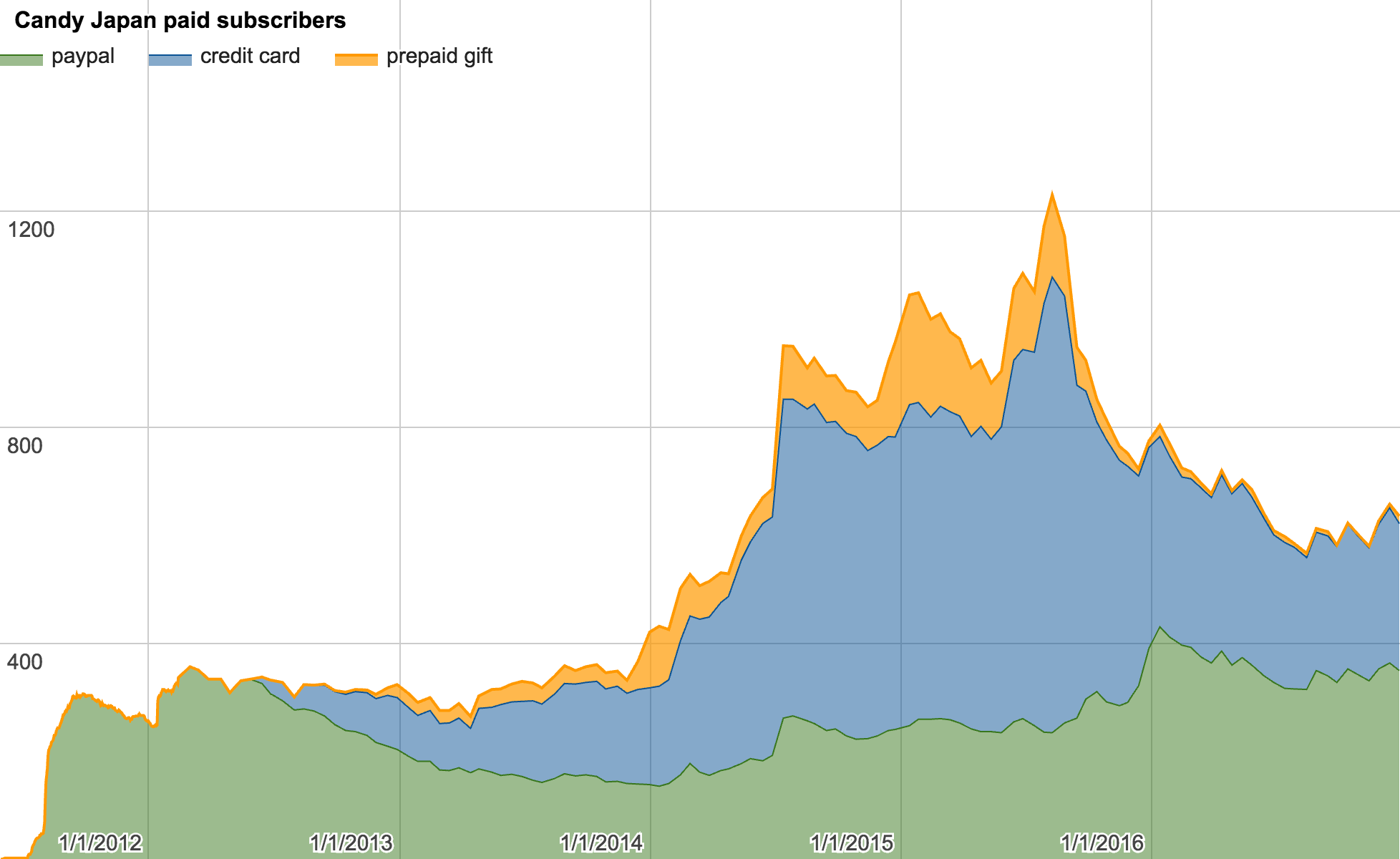
You might notice that in 2014 something wonderful happened: the subscriber count roughly tripled. I didn't do anything clever to make that happen, rather I got lifted by a wave as the whole concept of Japanese candy started to trend.
Below is a chart from Google Trends showing how many people were searching for japanese candy:
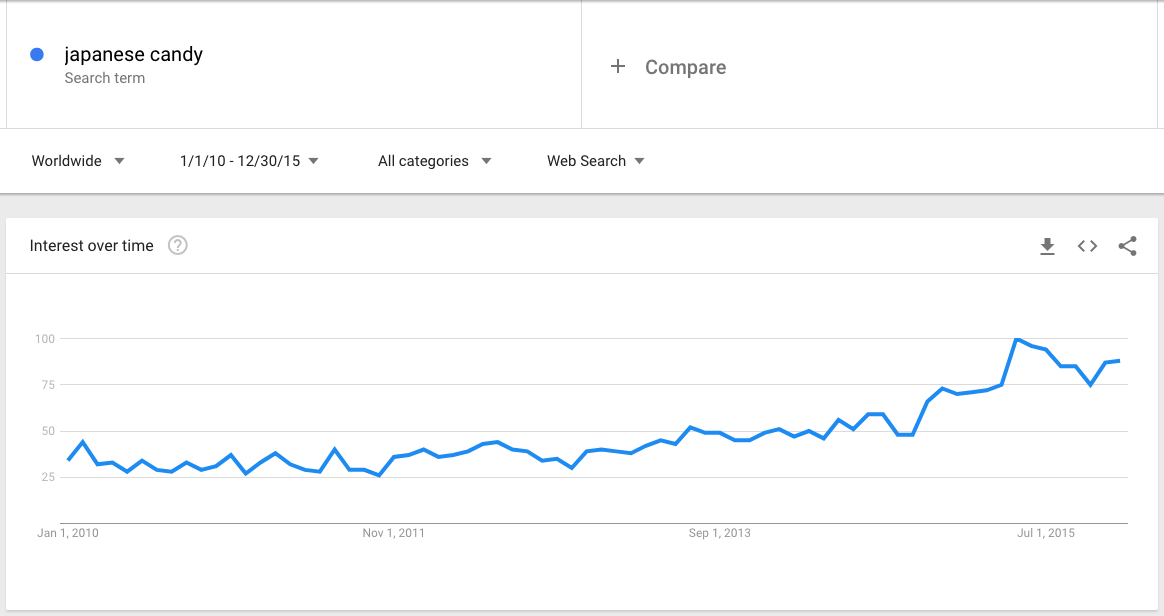
As you can see the number of searches slowly builds, but from 2014 to 2015 it rapidly doubles, making it about three times as much as it had been in the early days. This was directly reflected in our subscriber count.
By no means was this still a big business, but Candy Japan alone could now cover our living expenses, and I started to get hopeful that it could get bigger still.
Next year in 2015 it seemed that my hopes were coming true; the subscriber count crossed 1200. Or so I thought. What seemed to be the best year ever turned out to be miserable: I discovered that I had been hit by credit card fraud. All those new subscribers beyond the first 800 were actually fakes who had subscribed with stolen credit card numbers.
I had already sent them the items, but now had to return all the money and on top of that pay a bunch of fees. Add insult to injury a lot of shipping addresses turned out to be fake as well, so I had hundreds of boxes returned to my address. Our mailbox was constantly swamped and our apartment was littered with returned boxes I had to manually examine to see if they were from legit subscribers or fakes.
While this fraud issue was going on, I was also in the process of moving my tax residency to Japan. It was a stressful year spent dealing with fraud and taxes. I even got a phone call from a US police officer after someone had complained to them about an unknown charge on their card, because their number had been stolen and someone used it to place a candy order.
Fraud is something that affects any business that accepts credit cards, even charities. Even if everything seems to be OK, make a habit of reading through new orders as they come in. Pay attention to email addresses, shipping addresses and bursts of failed payments. You can spot suspicious behavior if you do this.
I thought I didn't have a problem, until thousands of dollars started getting reversed. While I did know that a small percentage of all ecommerce is fraud, I always understood that as fraud being interlaced with legit orders. 100 real payments, 1 fake payment, 100 real payments, 1 fake payment. But that's not how it played out. Rather it was 10000 real payments over years lulling you into believing that everything is fine, then suddenly getting hit by hundreds of fake payments in a matter of days.
If 2015 was a high-anxiety year, 2016 was rather quiet by comparison. Subscriber numbers did continue to slide, as competition was getting tough while also the overall interest in Japanese candy was waning. I ran some marketing experiments, but was unable to find any good channels.
2017
This year was a bloodbath. From the start of 2017 to the end, subscribers declined by 40%, going from 636 to 385 members.
Here's the subscriber chart extended to include 2017:
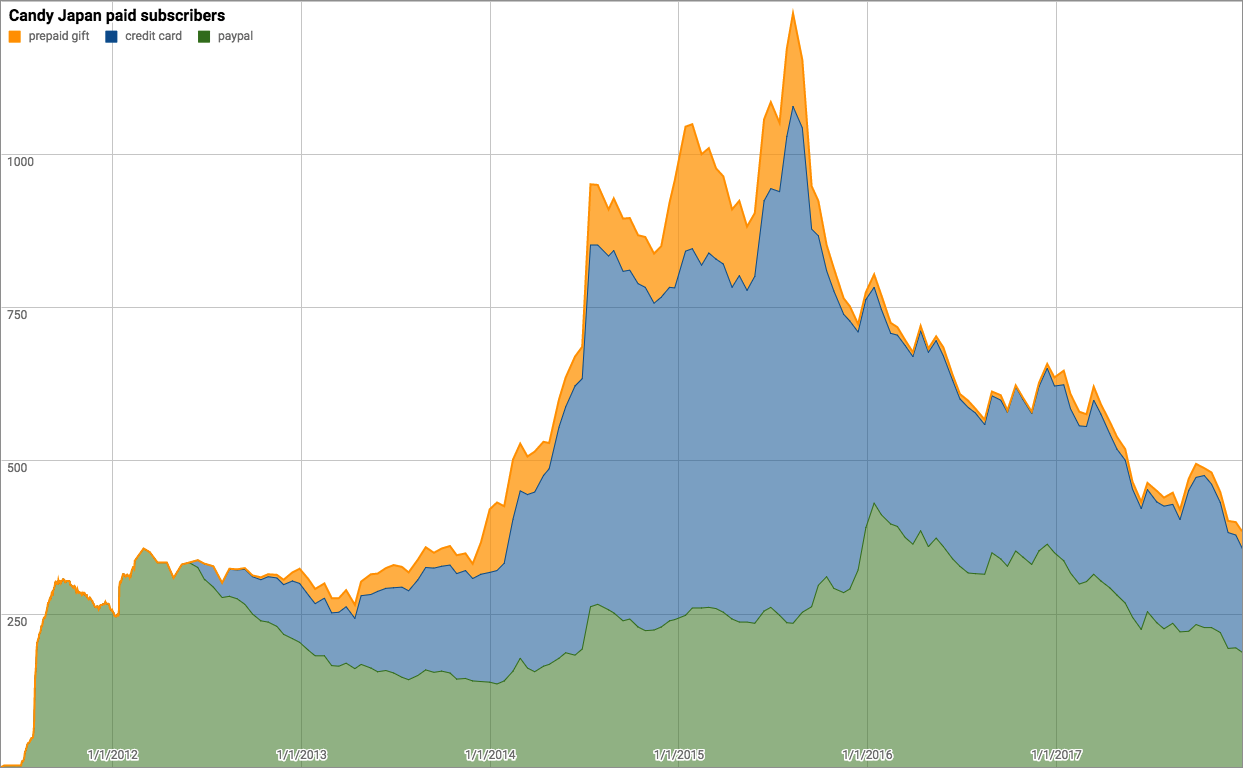
Sales stats
Sales net of refunds: $141,220
Expenses: $102,846 (candy, shipping, boxes, ads)
Profit: $38,374
Wage per hour (assuming ~2 hours per day): ~$50
Site stats
Visits: 138k
Unique visitors: 114k
Page views: 241k
Traffic sources of note: Search engines (30%), Social media (22%), Paid ads (13%)
What went wrong?
This year I didn't have as much to blog about. In 2016 I had five popular posts (1 2 3 4 5), while in 2017 I only managed two (1 2). The posts tend to send a lot of high-quality traffic, so the impact was bigger than you might expect. I haven't figured out how to invent posts from thin air when I simply have nothing new to share.
Organic search traffic declined from 68,383 clicks in 2016 to 41,358 clicks in 2017. I think the reason for this is twofold. First, competition is getting tougher, meaning there is fierce competition for head search terms. I have been pushed off the first page completely for some.
Secondly overall searches for Japanese candy declined by 33% according to Google Trends, while on YouTube it more than halved. There was a point when a lot of YouTubers were doing a video showing their reactions to eating strange Japanese candy, but now that is ancient history.
Changes in USDJPY exchange rates made me decide to increase USD prices. Naturally a higher price leads to less conversions.
Another major hit was that all the packages we were sending to Germany started bouncing back. After this continued for several shipments, I decided just not to ship to Germany any more. This meant losing 10% of subscribers and needing to send a lot of refunds for packages that never arrived.
Things I tried
Tried paid YouTube ads, and while I did get some subscribers, in the end they were just too expensive to keep running. Tweaking the ads was very time consuming and expensive (but fun). I learned a lot though and gave a presentation about it at a Hacker News meetup in Osaka. I managed to decrease their cost, but not enough to break even.
Tried putting all of our old newsletters on the site. Had to reformat them by hand from ill-defined HTML newsletters to MarkDown. Attempts at automating with BeautifulSoup failed, as there was no coherent layout. I submitted them to webmaster tools, but this resulted in… silence. Less than one organic search click per day.
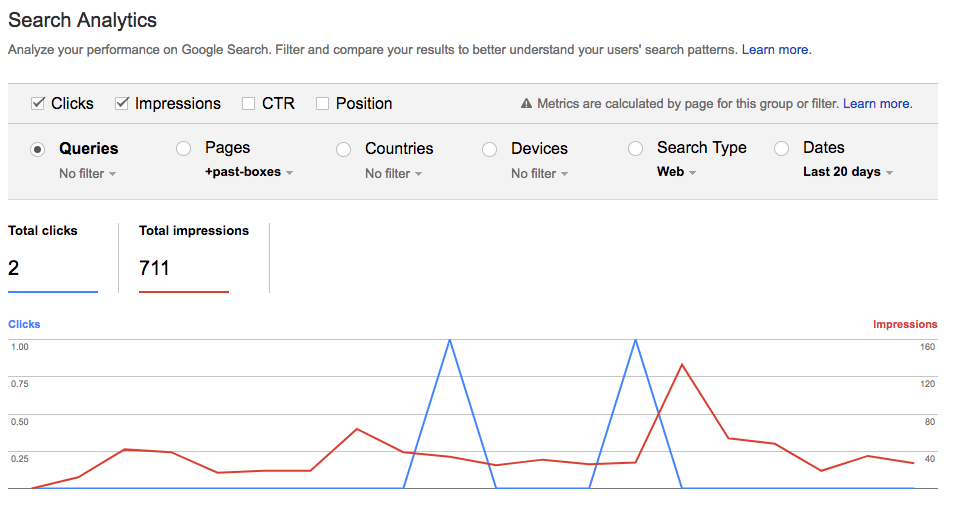
Improved response time by serving the landing page from a static file served by Google CDN instead of from Python. This may increase conversions slightly and could improve SEO, but there is still a lot of work to do to make the site faster.
Tried to branch out by asking my customers if they would like to subscribe to Gashapon capsule toys, but the result was near-silence. I have a bimonthly newsletter with a great open rate, I wonder what other ideas I could throw at them?
Tried redesigning the site to be more colorful and not so gloomy, but am not sure if it helped or hurt. I don't have enough data anymore to say for sure, as you need hundreds of conversions to say anything meaningful.
Tried to learn how to take better product photos for putting on the site to match what my competitors are doing, but was unable to take decent shots by myself. In the end hired a photographer to do it.
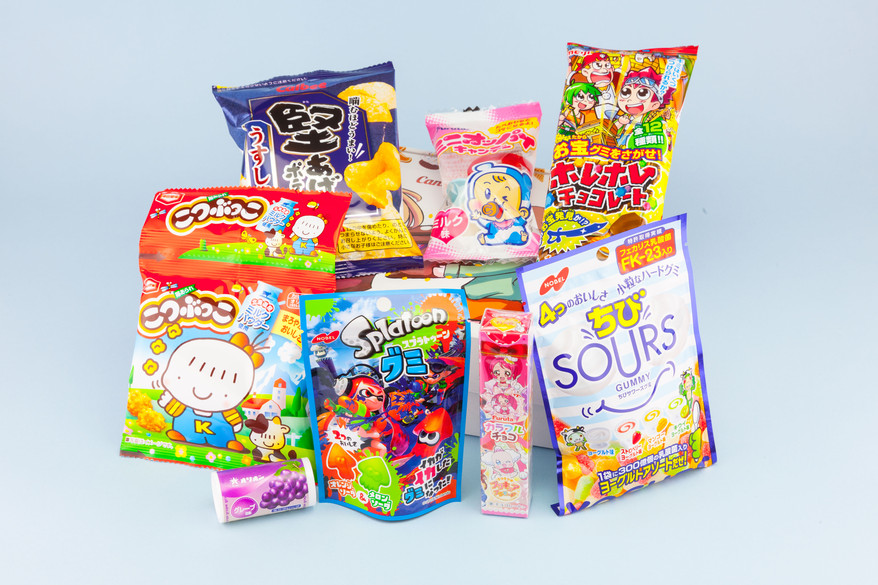
The pictures look good, and will probably boost conversions a bit. Again I can't be sure of the impact due to lack of data. Who knows, maybe visitors might feel that seeing the products ruins the surprise or something.
Conclusion
I wish I could report having discovered some kind of a breakthrough marketing trick to reverse the decline, but sadly no.
For the time being Candy Japan is still popular enough to keep running, and since I have most things automated I see no reason to shut it down. If the trends of declining popularity of Japanese candy and increasing competition continue, 2018 will be another down year.
I will start spending more time trying new projects again. Hopefully nothing involving physical products this time!
Thanks for reading, and do subscribe if you'd like to try some candy for yourself. You can use the code HACKERNEWS to get 10% off.
